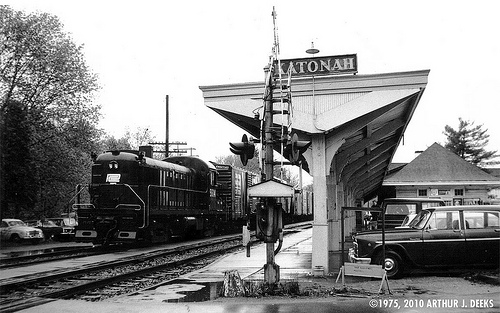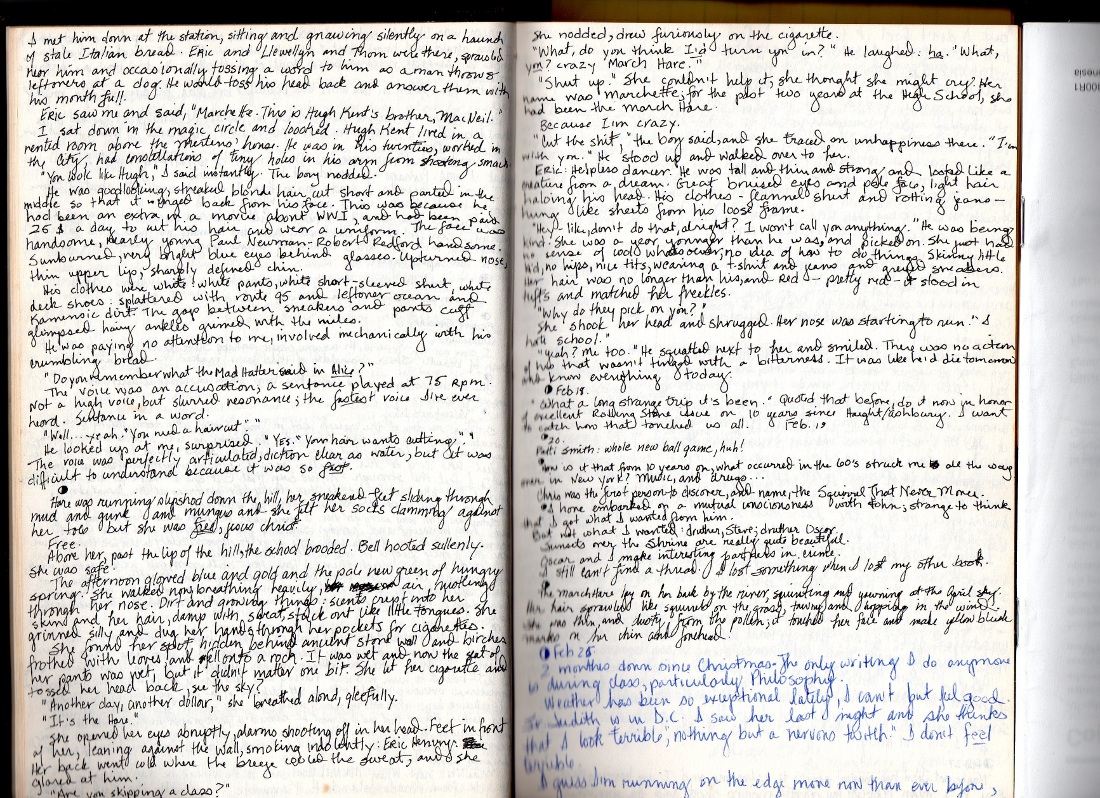Icarus Descending (52 page)
Authors: Elizabeth Hand

“You’re to come with us,” it said. I did not fight, and after a moment I saw Jane grow limp as well. She shot me a last desperate glance as they led us from the shouting throng, up the steps to where Metatron stood surrounded by his cloned aides. I tried to shake off my captor’s hands, and looked to see Tast’annin and his two companions being led out through the cave’s entrance. Then the energumen pulled me, until I faced Metatron upon the dais. He looked at me and smiled, his eyes throwing off shafts of jade and emerald where they caught the reflection of Icarus’s brilliance. His voice was mocking as he greeted me.
“
Come with me, ladies and gentlemen who are in any wise weary of London: come with me: and those that tire at all of the world we know: for we have new worlds here.”
Another wave of shouts and snarling cheers rose from the cavern. Metatron stretched out his glowing hand to touch my chin.
“You are very fortunate, Wendy Wanders, to see the new world that awaits us.”
For a long moment he held my gaze, then pushed me away. “Bring them to the
Izanagi
with Imperator Tast’annin,” he commanded the energumens, and stalked from the platform.
Behind me in the darkness Luther Burdock’s corpse lay cold and still. Above it the empty-eyed forms of his cloned brethren stared impassively into the sky. I turned to where the corpse of the creature who had called herself his daughter was sprawled upon the floor. As I stared, it seemed to move slightly. Then it
did
move, and with pity and horror I watched as it struggled to turn its head. At my side, Jane’s brown eyes grew wide with rage and compassion.
“It’s not dead yet!—” She looked around for help. “They can’t just leave it, it’s not—”
But then our guards tugged gently at us. Jane’s hand groped for mine as we were led away. A warm wind poured through the cave’s opening, and a rosy light that came from the elÿon fleet.
All about us the air echoed with cries of wonder and terror, as the geneslaves and people of Cassandra gazed into the sky. I walked slowly before my captors, as though I were being taken to see a marvelous surprise and wanted to delay the pleasure. I could see my own shadow in the brilliance cast off by Icarus, faint as though drawn in water. I continued slowly until someone pulled Jane’s hand from mine. Then I was borne by arms larger and stronger than my own, up the rocky slope to the billowing crimson cloud that had swallowed the Aviator Tast’annin. I did not look back, though I heard Jane calling for me, her voice faint as a swallow’s thrown into the throat of a storm: not then, nor when the energumen carried me into the waiting elÿon.
With surprising gentleness, it bore me through twisting passages, until we reached a tiny room where it placed me in a sling. Carefully it bound me against the rigors of the journey, then showed me where soon tiny needles would prick my wrists and throat and lead me into dark sleep. Only after it left did I turn to gaze out the tiny window opening onto the world.
It was all there: trees, rocks, mountains, river: all of it, and people besides, weeping and pointing at the sky; and aardmen and energumens and the other geneslaves, rushing to herd their charges into me waiting elÿon. For many minutes I stared out, never lifting my gaze to the sky. Not until the walls surrounding me quivered, and I knew the elÿon was beginning to take flight. Then I looked up.
There it was. Icarus, the falling boy, the black eye of fate gazing down upon us with that deceptively calm and brilliant stare. I could imagine his laughter, a sound that would rock worlds, and see his hand reaching for me, reaching for all of us: vast and implacable and terrifying. Soon he would be upon us; soon there would be no escape. But then like a cold kiss I felt the prick of unseen needles upon my flesh. Warmth surged into my veins. I saw the eye recede, saw the imagined retreat of the asteroid into the void; and in darkness fell into my final voyage.
In the darkness something warm and wet streams from Kalamat’s breast. Behind her closed eyelids she can sense a brightness, a warmth; the promise of something wonderful, something more marvelous than she has ever known. She can feel her father’s hands upon her forehead, so small and light they might be leaves blowing across her skin, and though the raging pain does not subside, her body relaxes, her hands unclench, and her jaw, and she tries to speak.
“Daddy,” she chokes. “Daddy—”
Even as she winces from the effort, she smiles; because this time she knows he hears her.
“Do not fear the dark, daughter,” he whispers. His voice catches, and something falls upon her face. “The night can never harm you, and anyhow soon it will be time for us to wake.”
“Yes,” she wants to say. “Yes, I know.” But already death has drawn a noose tight around her, yanking words and finally thought from her mind.
And then in the darkness Kalamat smiles, knowing her father is there amid all those small struggling figures, knowing that even death is a small thing now. Because she has found him, she has found him at last.
Elizabeth Hand (b. 1957) is the award-winning author of science fiction and fantasy titles such as
Winterlong
,
Waking the Moon
,
Black Light
, and
Glimmering
, as well as the thrillers
Generation Loss
and
Available Dark
. She is commonly regarded as one of the most poetic writers working in speculative fiction and horror today.
Hand was born in San Diego and grew up in Yonkers and Pound Ridge, New York. During the height of the Cold War, she was exposed to constant air raid drills and firehouse sirens, giving her early practice in thinking about the apocalypse. She attended the Catholic University of America in Washington, DC, where she received a BS in cultural anthropology.
Hand’s first love was writing, but many Broadway actors lived in her hometown of Pound Ridge, and by high school she was consumed with the theater. She wrote and acted in a number of plays in school and with a local troupe, The Hamlet Players. After college, writing stories became her primary interest, and the work of Angela Carter cemented that interest. Hand realized that she wanted to create new myths and retell old ones, using a heightened prose style.
Hand’s first break came in 1988 with the publication of
Winterlong
. In this novel, Hand explores the City of Trees, a post-apocalyptic Washington, DC. The story focuses on a psychically enhanced woman who can read dreams and her journey through the strange city with her courtesan twin brother. The book’s success led to two sequels:
Aestival Tide
and
Icarus Descending
. All three novels were nominated for the Philip K. Dick Award.
Beginning with the James Tiptree, Jr. Award–winning
Waking the Moon
, Hand wrote a succession of books involving themes of apocalypse, ancient deities, and mysticism.
Waking the Moon
centers on the Benandanti, an ancient secret society in modern-day Washington, DC. that also appeared in
Black Light
, a
New York Times
Notable Book.
In 1998, Hand released her short story collection
Last Summer at Mars Hill
. The title story won the Nebula Award and the World Fantasy Award. Most recently, she has published two crime novels focusing on punk rock photographer Cass Neary—the Shirley Jackson Award–winning
Generation Loss
(2007) and
Available Dark
(2012).
When Hand isn’t writing stories of decadence and deities, she divides her time between the coast of Maine and London, with her partner, UK critic John Clute. She is a regular contributor to numerous publications, including the
Washington Post
and the
Magazine of Fantasy and Science Fiction
.

Hand is the oldest of five siblings in a very close-knit family. This photo shows them in 1967, on one of their camping trips to Maine and Canada. All five kids, then under the age of ten, shared a canvas tent with their parents. From left to right: Brian, Patrick, Elizabeth, Kathleen, and baby Barbara. “Maine imprinted on me during this time, which is why I've lived there for the last twenty-five years,” Hand says.

Hand in her driveway with her beloved family dog Cindy shortly before leaving for college in Washington, DC. “Note the skirt, made from a pair of massively embroidered jeans; my favorite red velvet beret, which my mother gave me for Christmas and which disappeared under dark circumstances a few years later; my Mom’s suede jacket (I added the denim cuffs); and needlework belt with my initials on it, made by my grandmother Hand. You can’t see them, but I was also wearing my lace-up Frye boots.”

In her journal, Hand once wrote, “I am being haunted by a town.” The town was Katonah, New York, which she transformed into Kamensic Village, the setting or background for much of her fiction. This photo from 1975 shows the train station where characters Lit and Jamie Casson make their escape at the end of the novel
Black Light
.

Hand recalls: “In 1976, I was hitchhiking in Putnam County, New York, with my friend Katy. A guy our age picked us up, we drove around and hung out for a few hours, and he then dropped me back at my parents’ house in Pound Ridge. It was only after I got home that I realized I’d left my journal in his car.
Flash forward to 1999, shortly after
Black Light
was published. I was visiting my folks in Pound Ridge when the phone rang: I picked it up and a voice asked, ‘Is this Elizabeth Hand?’ It turned out to be the guy who’d picked us up—he’d seen a copy of
Black Light
in his local bookstore and remembered my name (which was in the journal). And, when he went back and read the journal again (which he’d done back in 1976 as well—hey, I would have, too), he realized that some of the people and places I’d written about in the journal ended up in
Black Light
.”

